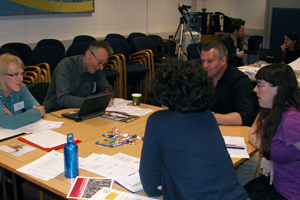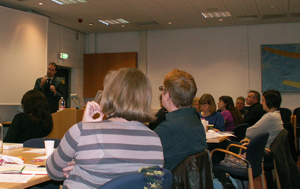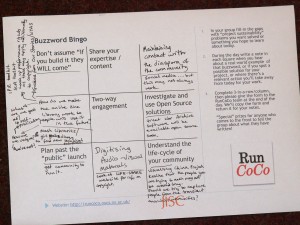The fourth RunCoCo workshop took place in Leeds on November 3rd, 2010. A group of 30 people gathered to learn about, discuss, and share experiences of online community collection work and sustainability.

Delegates discuss sustainability issues
Material from the day is being published on the RunCoCo website. Learn more about the day through the tweets (@runcoco) and through summaries of the event published in other blogs, for example by Alison Cullingford and Hope Wolf (Strandlines).
V. inspiring event – I have masses of ideas to take back + think about.
Alison Cullingford (PaxCat)
The programme included a series of presentations on different aspects of sustainability, and an interactive session led by Sarah Fahmy (Strategic Content Alliance) and Alastair Dunning (Programme Manager, JISC). Four short project introductions were also offered, giving participants a chance to hear about ongoing and planned projects in the area of online community collection.
Enjoyed hearing what other organisations are doing + how they are approaching their projects. Interesting points to consider. Rachel Tapp (Our Stories)
Speakers and talks
The first speaker of the day was Beccy Shipman (Project Manager for LIFE-SHARE), who talked about collaborative working and how to make it last. She discussed the different stages of collaboration and illustrated them with examples from the LIFE-SHARE project and the White Rose libraries’ collaboration in the area of digitisation services and expertise. She also offered useful advice on what to look for when seeking a collaboration partner, suggesting looking for someone who is:
- Committed to collaboration
- Trustworthy
- Willing to trust
- Good communicator
- Supported by institution
- Open minded and willing to experiment
(More information about Beccy’s talk, including copies of the presentation slides, can be found via the Events page)
Kate Lindsay, Project Manager for the Great War Archive (GWA) showed how GWA used Flickr after the end of the project to allow people to continue to share their WW1 images. She demonstrated how there had been unexpected benefits of doing this: the community had grown and people were not only using the Flickr group to publish images but also to communicate and share information – to add comments, ask questions and discuss the content of the pictures. Based on her experience of doing this work for the GWA and her knowledge of later developments in the area of Flickr, social networks, and Web 2.0, Kate offered advice, suggestions, and tips for projects wanting to do something similar. (More information about Kate’s talk, including copies of the presentation slides, can be found via the Events page)
Leigh Garrett from Visual Arts Data Service talked about the work of the Look here! project in examining issues of sustainability of digital collections. He suggested that projects and services need to look for a combination of methods to sustain and grow collections such as including diverse revenue streams, provide a range of services, embedding, licensing, collaboration, vision, creativity, and persistence. In reply to his own question ‘Where do we go?’, he listed four areas: ‘intrinsic and extrinsic collaboration’ (sharing resources, costs, and expertise), ‘discoverability and critical mass’, ‘measuring value and impact’, and ‘learning from each other’. (More information about Leigh’s talk, including copies of the presentation slides, can be found via the Events page)
Lisa Greenhalgh from Our Stories, based at West Yorkshire Archive Service, presented on ‘Building digital preservation into community collecting’. After showing some thought-provoking examples of what can happen to a community collection if digital preservation is not made part of the project, she offered a range of suggestions, recommendations, and advice on how to ensure digital objects can be preserved. (More information about Lisa’s talk can be found via the Events page)
Interactive session
The session between lunch and afternoon coffee was run by Sarah Fahmy and Alastair Dunning. Sarah opened by giving a presentation on ‘Sustaining Digital Resources’ and Alastair offered some case studies to illustrate certain points. The workshop participants then discussed in groups how their projects could or had engaged with the suggested success factors:
- Empowering leadership
- Creating a strong value proposition
- Creatively managing costs
- Cultivate diverse sources of revenue
- Establish realistic goals
(More information about the session, including copies of the presentation slides, can be found via the Events page)

Alastair Dunning and Sarah Fahmy introduce the interactive workshop session
Project introductions
In addition to the talks and interactive session, the programme included four short ‘project introductions’ by Stuart MacDonald (AddressingHistory), Alison Cullingford (PaxCat), Nicky Ferguson (Visualising China), and Gethin Matthews (Welsh Voices of the Great War Online). These were included as an opportunity for interested parties to introduce a project or project idea to the participants in order to stimulate and facilitate sharing of ideas, experiences, etc during the day. (More information about the short talks, including copies of the presentation slides, can be found via the Events page)
Interesting range of speakers – liked the short project introductions.
Networking opportunities
Participants were encouraged to use the event to share ideas and experiences and a lot of networking was going on during the coffee and lunch breaks.
Super networking opportunity – made great links. Alison Cullingford (PaxCat)
Really good to meet other people & hear about their projects & think about how to do stuff together. Jen Fox
It was encouraging to hear so many people say they had made useful contacts or even met potential project partners during the day. It will be interesting to see what collaboration may come out of this, hopefully resulting in new and sustainable community collections.

Click on this photo to see the sort of experiences recorded on the day by delegates who were asked by the RunCoCo team to fill-in bingo cards. Later we will report back on all this excellent feedback.
Thanks to everyone
RunCoCo would like to thank all participants and speakers for participating in the event and contributing to its successful completion. We are also extremely grateful to LIFE-SHARE for helping with the venue and the practical arrangements before, during, and after the event. Last, but not least, thanks to Jodie and Matt for recording the sessions to allow us to make material available to those who weren’t fortunate enough to be able to attend the event on the day.
RunCoCo workshop on sustainability « RunCoCo…
Here at World Spinner we are debating the same thing……
[…] the methodology we used, and the lessons learned. A write up of the day can be found on the RunCoCo Blog along with a copy of my own slides. I’m particularly thrilled to find out through Hope […]